10 Best Foods for Pregnancy
Here’s advice from nutrition experts on 10 best foods for pregnancy. You may not need to like or eat them all, but you can pick and choose your favorites to give your pregnancy a nutritional boost.
Number 1 – Eggs
Eggs come first on my list of 10 best foods for pregnancy. In addition to more than 12 vitamins and minerals, eggs contain lots of quality protein, which is essential for pregnancy. “It’s amazing what you get in one egg for only about 90 calories.
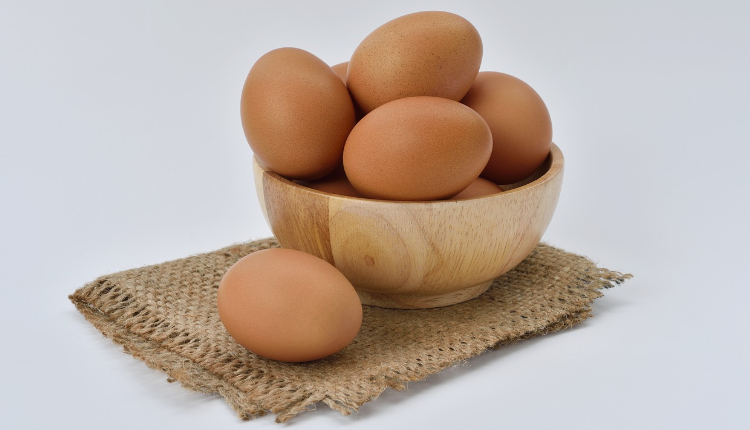
“Your baby’s cells are growing at an exponential rate, and every cell is made of protein, and as a pregnant woman, you have your own protein needs.”
Eggs are also rich in choline, which promotes your baby’s overall growth and brain health while helping prevent neural tube defects. Some eggs even contain omega-3 fats, important for both brain and vision development. (Brands that have omega-3s will probably state it on the label. DHA-enriched eggs contain the most beneficial form of omega-3s.)
As for the egg’s bad rap about cholesterol? Not warranted, expert says, It turns out that eating saturated fat does much more damage to your cholesterol level than eating the cholesterol naturally found in food. And while eggs are high in cholesterol, they’re also relatively low in saturated fat, with only about 1 1/2 grams per egg.
“Healthy women with normal blood cholesterol can consume one to two eggs a day as part of a balanced diet low in saturated fat. But if cholesterol is a concern for you, substitute egg whites for whole eggs.
Need more convincing? Eggs are cheap, easy, quick, and versatile and therefore, in my list of 10 best foods for pregnancy. When you’re too exhausted to cook a full meal, a couple of hard-boiled or scrambled eggs are just fine for you.
Number 2 – Salmon
Salmon is an exceptionally good source of omega-3 fats, which are good for your baby’s development. This makes Salmon a must on my list of 10 best foods for pregnancy. Salmon is rich in high-quality protein and may help boost your mood. Salmon has low amounts of methylmercury, a compound that can be harmful to your baby’s developing nervous system, so it is better to pick fish with low amounts of methylmercury or fish that do not contain methylmercury.
Eating no more than 12 ounces per week when pregnant to avoid ingesting too much mercury is better.

Health benefits of salmon
- Eating salmon is beneficial in the treatment of osteoarthritis and other inflammatory joint conditions.
- Eating salmon regularly helps reduce the risk and incidence of depression
- Eating salmon increases your cardiovascular health
- Eating salmon twice a week helps protects your eyes
- Eating salmon while pregnant and nursing can boost learning capability and academic performance in your child
- Salmon contains vitamin D which is crucial in maintaining your optimal health.
- Salmon is an excellent source of tryptophan, an all-natural sedative. want to sleep well? make salmon part of your meal.
Number 3 – Whole Grains
Whole grains are a natural source of protein and carbohydrates that should be part of your meal during pregnancy, they are found in a
range of everyday foods including bread, cereals, rice, pasta, and noodles. Common whole grains include wheat, oat, barley, brown rice, and popcorn.
Whole grains are important in pregnancy because they’re high in fiber and nutrients. Whole grains are packed with nutrients including iron, selenium, magnesium, vitamin B, folic acid, and niacin, which help supply energy for your baby’s development and also help build the placenta.
Whole grains are rich in fiber which helps prevent constipation – a common complaint in pregnancy.
To prevent constipation during pregnancy, you should make whole grains part of your meal. You can substitute garri for wheat.
How much whole grain should you eat?

You are to eat four to six servings of bread and cereals (preferably wholegrain or wholemeal) daily.
One serving equals two slices of bread, 1 1/3 cups of breakfast cereal or one cup of cooked brown rice, pasta or noodles.
The best way to increase your intake of whole grains is to swap sugary breakfast cereals and white bread for wholegrain cereals such as pasta or seedy bread. You can get most of your recommended daily intake of whole grains by eating a bowl of fortified cereal for breakfast, making a sandwich with two slices of whole-wheat bread for lunch, and eating a dish that contains whole-wheat pasta or wheatmeal with soup for dinner.
Source of whole grain
Best: wholemeal or wholegrain bread
Better: brown rice, pasta.
Good: cereal, noodles, popcorn.
Number 4 – Beans (Red beans)
Beans are a good source of protein. There are different kinds of beans in the market but pregnant women should eat more of red beans, so we will be looking at red beans today. Red bean is a nutritious food but few pregnant women have known about its great benefits.
Do you know that eating red beans regularly can help your body produce more breast milk?. If you can eat enough red beans during pregnancy, you likely will not have issues with making your breast milk flow during childbirth as your breast milk will be ready for your newborn baby and breastfeeding your baby will be at ease.
Are there Good Nutrients in Red Beans
Loads of nutrients in red beans:
According to research, red bean is one of the foods containing a high amount of antioxidant. Eating red beans regularly will help you protect yourself from disease and ensure safety for your baby because if the mother has good health, the baby is also healthy.

Red bean is rich in protein as you may already know, it’s also rich in omega 3 fatty acid helping the heart healthy.
Red beans contain Vitamin B1 which strengthens the immune system and blood circulation, so you don’t have to worry about common fatigue during pregnancy.
Vitamin B6 in red beans prevents pregnant women from the risk of flu, also helps relieve stress and fatigue.
Red beans are the rich source of iron to help a pregnant woman avoid anemia, pale skin. Iron helps improve the immune system and is good for the development of your baby’s brain, regulate body temperature, and prevent pregnant women from constipation.
Saturated cellulose in red bean significantly reduces the amount of cholesterol in the blood.
Red beans are laxative, diuretic; helps detoxify, reduce blood pressure and regulate blood sugar.
Red beans also have other features such as edema treatment and prevent pregnant women from toxin deposits in the body, which is harmful to your health. Red beans are one of the beauty cares for pregnant women during pregnancy.
Red beans have a sweet taste, if it is too sweet for you, you can combine red beans with some other starches to cook nutritious foods and also to help change the sweet taste during pregnancy. You can cook red beans and rice, red beans and yam porridge, sweet red beans soup, you can also do red beans with side vegetables like pumpkin or red beans and mixed vegetables… yeah this is my favorite, and this makes red beans a must in my list of 10 best foods for pregnancy. I always add snail and flat prawn to it (cut into small bits), you feel blood circulating through your veins while eating this recipe.
Number 5 – Sweet Potato
Sweet potatoes get their orange color from carotenoids, plant pigments that are converted to vitamin A in our bodies.
Although consuming too much “preformed” vitamin A (found in animal sources, such as liver, milk, and eggs) can be dangerous, carotenoids are a different type. They’re converted to vitamin A only as needed, so there’s no need to restrict your consumption of vitamin A-rich fruits and veggies.
Other benefits of sweet potato
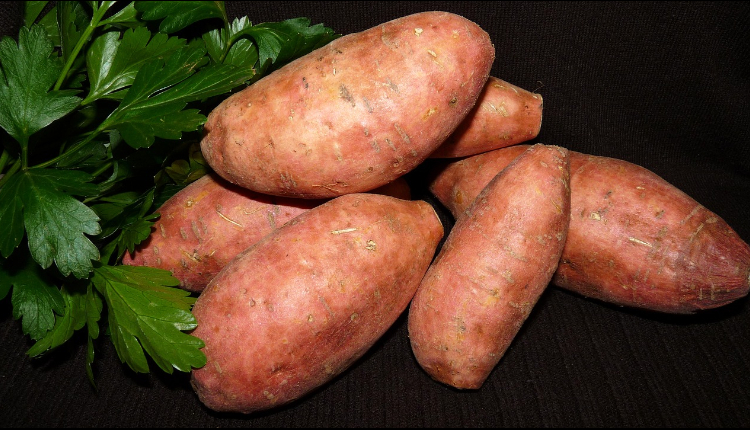
Vitamin C and Iron – Vitamin C is vital to the absorption of iron. Iron is essential to you and your baby’s health during pregnancy.
Nutrition experts recommend that pregnant women consume 80 to 85 milligrams of vitamin C and 27 milligrams of iron each day. A 1-cup serving of sweet potato baked in the skin contains 39.2 milligrams of vitamin C, which is almost half of the recommended value. A 1-cup serving also contains 1.38 milligrams of iron.
Dietary Fiber – Dietary fiber supports good health by introducing natural bulk to your digestive system. One of the common symptoms of pregnancy is constipation. By consuming 22 to 28 grams of dietary fiber daily, you reduce the occurrence of constipation and prevent digestive problems. Pregnant women should eat 28 to 34 grams of dietary fiber per day. A 1-cup serving of sweet potato has 6.6 grams of dietary fiber, which is significant for one food item.
Vitamin B-6 – Vitamin B-6 is an important vitamin during pregnancy because it helps in the formation of red blood cells and may prevent morning
sickness. The American Pregnancy Association advises consuming 1.9 milligrams of vitamin B-6 each day. A 1-cup serving of sweet potato
provides almost 0.6 milligrams of vitamin B-6.
Potassium – Pregnant women should consume 4.7 grams of potassium per day and when you deliver your baby and start breastfeeding, you should increase your intake of potassium to 5.1 grams per day. Sweet potatoes contain 950 milligrams of potassium, which makes them an extremely
beneficial food during pregnancy.
Just like beans, sweet potato is inexpensive and versatile. You can prepare it in so many ways, you can make sweet potato porridge, add your choice of fish and vegetables, you will like it.
Number 6 – Dark green, leafy vegetables
Dark green leafy vegetables are loaded with vitamins and nutrients, including vitamins A, C, and K, as well as the all-important folate. This makes dark green leafy vegetables a must on my list of 10 best foods for pregnancy.
Spinach; kale; mustard greens; turnip greens; broccoli; Brussels sprouts; red leaf lettuce etc. These vegetables have leaves and the leaves have to be dark. There is a large variety available, there’s likely to be at least one or two each woman likes.
These power-packed vegetables help keep your body healthy and with growing a baby in the womb, you should make these your friends.
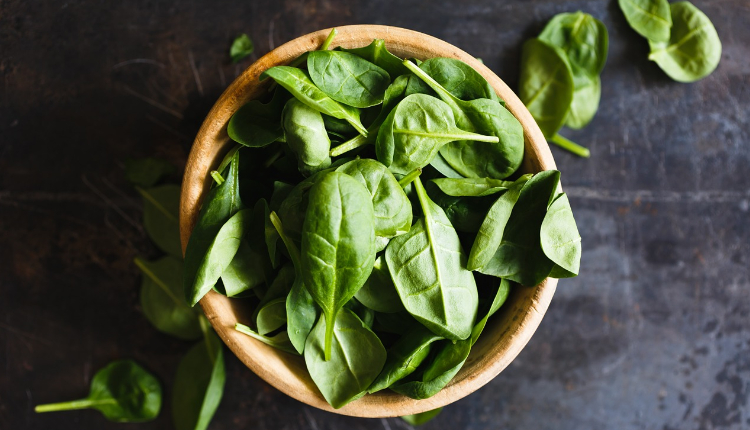
Benefits of Dark Green Vegetables:
Natural Folate – You can get all the benefits of folate from a great source: dark leafy green vegetables. I think natural is best.
So, to me, simply choosing foods naturally high in folate, such as leafy green veggies, is a wise choice. Folate has been shown to prevent spinal cord birth defects, so as a woman looks toward pregnancy, she wants to eat plenty of foods with this nutrient.
In pregnancy, our bodies use this nutrient to build genetic material. If ever there was a nutrient that women in the child-bearing years should love, it’s this one.
Vitamin A and C – Vitamin A and C are known for their work in helping our immune system and vitamin A is known for growing healthy bones and teeth.
One study even showed that women in SE Asia who had good levels of vitamin A had lower maternal mortality rates. But, we don’t want to get too much vitamin A because there is an amount that becomes toxic and too much vitamin C can cause the opposite problem like constipation. So, what’s a pregnant mom to do? Eat dark leafy green veggies! They have both and are balanced in such a way that it’s nigh on impossible to overdose on these vitamins from this source because you’ll be full way before the overdose.
Calcium and Magnesium – Calcium and magnesium are known for helping our bones, but did you know they also help in keeping your blood pressure normal and are needed to help your blood clot normally? Calcium and magnesium work together to turn our food into energy. Did you read ENERGY!
What pregnant woman doesn’t want more energy? this means dark leafy veggies should be your best friend during pregnancy.
Iron – You should know how iron is recommended for pregnant women. But, did you know that the iron present in the foods you eat is easier
absorbed when you eat it with a vitamin C-rich food, such as leafy green vegetables? And, eating vegetables along with meat will help your body get more iron out of both of these foods. Those green vegetables that have red color patches on it are very good, depending on what you call it in your area, in Benin City it is simply called “green leaf” or “ebe-green” in the local dialect, choose the ones with dark red patches.
There are so many benefits you can get from dark green veggies while pregnant and if you are trying to conceive, natural folate from dark green vegetables is a wise choice…. and of course, there are several ways to enjoy dark green vegetables, choose to make vegetable salad this weekend, add spinach or your choice veggies to it.
Number 7 – Lean Meat
Meat is an excellent source of high-quality protein which makes red meat a common recommendation for a healthy pregnancy diet.
Red meat provides a big benefit to a pregnant woman’s growing blood supply, it’s iron-packed and helps keep your blood supply rich and healthy. Eating more red meat can help you meet your body’s new nutritional needs.

During the three trimesters of pregnancy, your blood volume increases by nearly 50 percent.
This increased blood volume brings oxygen and nutrients to your growing placenta and your baby. Each red blood cell contains a protein that’s specifically made to carry oxygen; iron is responsible for making this protein, known as hemoglobin. Without iron, your blood would have a less oxygen-carrying capacity. And since your body cannot make iron, it relies on iron consumed in your diet. Even though iron is an important mineral for everyone, whether you are trying to conceive or already pregnant, it becomes particularly important during pregnancy.
During pregnancy, look for lean meats with the fat trimmed off. “When buying red meat in particular, look for cuts that are around 95 to 98 percent fat-free”
Beef and pork stand out among meats because they contain choline in addition to protein. Don’t eat hot dogs in pregnancy, unless they’re heated until steaming hot. There’s a small risk of passing bacteria and parasites, from the meat to your baby.
Number 8 – Walnuts
Walnuts are one of the richest sources of plant-based omega-3s. Omega-3 fats help your baby’s developing nervous system, vision, concentration, understanding of words, and overall IQ as your baby grows older, and they can help prevent your baby from having asthma and eczema. You get almost 100% of your daily needs for omega-3 fatty acids from 1/4 cup of walnuts, about a handful and a handful of walnuts is a great choice for an on-the-run snack.
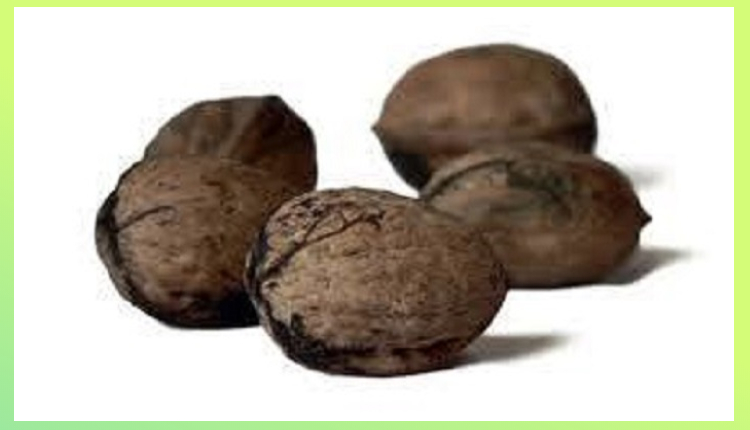
Walnuts are also packed with tons of healthful nutrients that will nourish your body and encourage the health and development of your growing baby.
Walnut has to be in my 10 best foods for pregnancy because walnuts help prevent pregnancy-related hypertension, low birth weight, postpartum depression, and protect your blood vessels.
Walnuts contain important anti-inflammatory phytonutrients and antioxidants, even some that are found nowhere else in nature.
Other main walnut nutrients are calcium, potassium, vitamin B, fiber, and magnesium. Walnuts are also a good source of protein.
Number 9 – Greek Yogurt
Greek yogurt typically has twice the protein of regular yogurt, making it favorite pregnancy food. And any kind of yogurt is a great source of calcium, which is vital in a pregnancy diet. Greek yogurt is a nutritious addition to your pregnancy diet that supplies many of the nutrients you need daily.
Greek yogurt provides about 2 percent of your daily requirement of vitamin A, a nutrient essential for the health of your growing baby’s eyes.
Calcium — a mineral you need plenty of during pregnancy — has a notable presence in a serving of Greek yogurt.
If you don’t take in enough calcium, the limited amount you have will go to your baby, depleting the calcium in your bones.
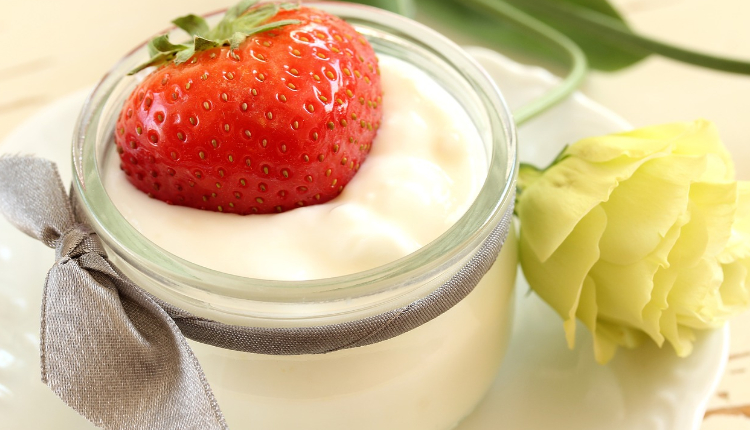
The goal during pregnancy is to make sure you provide everything your baby needs without sacrificing your health and nutrition, Calcium will help keep your bones intact while laying down a healthy skeleton for your baby.
Greek yogurt offers additional benefits that reach beyond vitamins and minerals. It has about twice as much protein as regular varieties of yogurt. Protein is crucial during pregnancy because it supports the development of your baby but also supplies you with the energy you need to grow a healthy body. A 7-oz. carton of plain Greek yogurt has about 20 g of protein, while flavored varieties contain about 12 g. Another advantage is that Greek yogurt contains less sugar than regular yogurt.
You can add natural honey to your plain yogurt to change taste if you like.
Number 10 – Colourful Fruits and Vegetables
Colorful fruits and vegetables are a must on my list of 10 best foods for pregnancy.
Eating plenty of green, red, orange, yellow, purple, and white fruits, and vegetables ensures that you and your baby get a variety of nutrients. Each color group provides different vitamins and minerals.
Another advantage of eating across the fruit and veggie spectrum: “During the later stages of pregnancy, your baby ‘tastes’ the foods you eat through the amniotic fluid. So if you expose your baby to a variety of healthy fruits and vegetables in the womb, you’ll increase the chance that your baby will recognize and accept those flavors later on.
Colorful fruits and veggies are packed with essential nutrients and full of fiber, fruits and vegetables are an important part of any healthy diet – and as a pregnant mother, you should have an abundance of fruits and veggies in your kitchen.
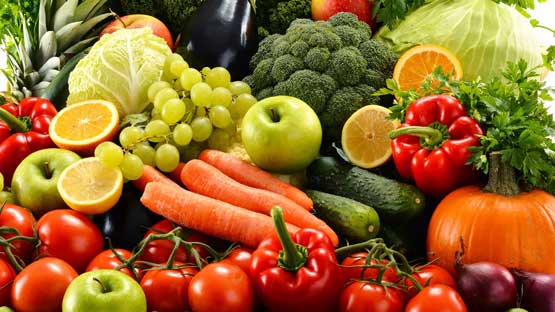
Key vitamins supplied by this food group include beta-carotene, needed for your baby’s cell and tissue development, vision, and immune system; vitamin C, crucial for your baby’s bones and teeth, as well as the collagen in your baby’s connective tissue; potassium, which helps control blood pressure; and folic acid, which helps prevent neural tube defects and promotes a healthy birth weight.
The fiber content of fruits and vegetables also provides a number of benefits, including keeping your bowels moving. This helps prevent constipation and hemorrhoids, two common problems during pregnancy.
Its best to take your fruits and veggies fresh, you can also keep them frozen. Here are some excellent fruit choices:
- apricots
- blueberries
- cantaloupe
- cherries
- grapefruit
- grapes
- guava
- kiwi
- mango
- papaya
- pear
- persimmon
- pineapple
- raspberries and blackberries
- strawberries
- tangerines
- watermelon
These are my list of 10 best foods for pregnancy that helps to support a healthy pregnancy.
When pregnant, taking a good supplement like Organics-G is an easy way to get the daily recommended nutrients to support you and baby. Herbal tea like PregTea makes dealing with pregnancy issues like nausea easier. PregTea supports your body through the trimesters of pregnancy, prepare your womb for childbirth and support breast milk production after delivery.
What do you have on your list of best foods for pregnancy? Please share it with us by leaving a comment below.
- Cryptic Pregnancy – All You Need To Know. - April 26, 2024
- Fertility Goals – 3 Action Points To Getting Pregnant - January 17, 2022
- 7 Tips To Preventing A Miscarriage - July 21, 2021

I am not seeing my period I am 43years old so what can I do and I need to be pregnant
Good morning madam, what exactly led to the situation of the menses?
hello admin
I also want to know about precautions.